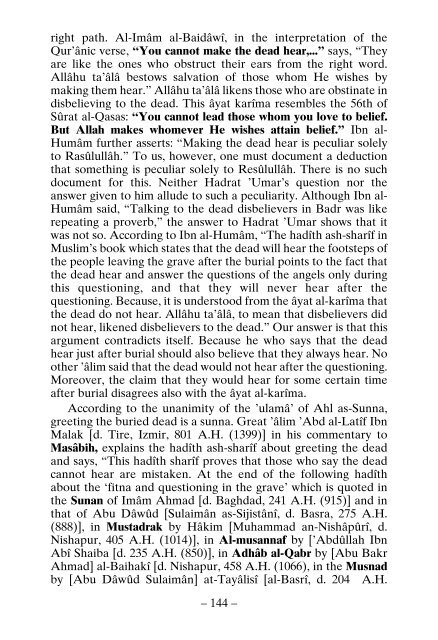Advice for the Muslim
ADVICE FOR THE MUSLIM Brief passages from the reputed books of ahl as-sunnat scholars are quoted for refuting corrupt Wahhabi and la-madhhabiyya beliefs.
ADVICE FOR THE MUSLIM
Brief passages from the reputed books of ahl as-sunnat scholars are quoted for refuting corrupt Wahhabi and la-madhhabiyya beliefs.
You also want an ePaper? Increase the reach of your titles
YUMPU automatically turns print PDFs into web optimized ePapers that Google loves.
ight path. Al-Imâm al-Baidâwî, in <strong>the</strong> interpretation of <strong>the</strong><br />
Qur’ânic verse, “You cannot make <strong>the</strong> dead hear,...” says, “They<br />
are like <strong>the</strong> ones who obstruct <strong>the</strong>ir ears from <strong>the</strong> right word.<br />
Allâhu ta’âlâ bestows salvation of those whom He wishes by<br />
making <strong>the</strong>m hear.” Allâhu ta’âlâ likens those who are obstinate in<br />
disbelieving to <strong>the</strong> dead. This âyat karîma resembles <strong>the</strong> 56th of<br />
Sûrat al-Qasas: “You cannot lead those whom you love to belief.<br />
But Allah makes whomever He wishes attain belief.” Ibn al-<br />
Humâm fur<strong>the</strong>r asserts: “Making <strong>the</strong> dead hear is peculiar solely<br />
to Rasûlullâh.” To us, however, one must document a deduction<br />
that something is peculiar solely to Resûlullâh. There is no such<br />
document <strong>for</strong> this. Nei<strong>the</strong>r Hadrat ’Umar’s question nor <strong>the</strong><br />
answer given to him allude to such a peculiarity. Although Ibn al-<br />
Humâm said, “Talking to <strong>the</strong> dead disbelievers in Badr was like<br />
repeating a proverb,” <strong>the</strong> answer to Hadrat ’Umar shows that it<br />
was not so. According to Ibn al-Humâm, “The hadîth ash-sharîf in<br />
<strong>Muslim</strong>’s book which states that <strong>the</strong> dead will hear <strong>the</strong> footsteps of<br />
<strong>the</strong> people leaving <strong>the</strong> grave after <strong>the</strong> burial points to <strong>the</strong> fact that<br />
<strong>the</strong> dead hear and answer <strong>the</strong> questions of <strong>the</strong> angels only during<br />
this questioning, and that <strong>the</strong>y will never hear after <strong>the</strong><br />
questioning. Because, it is understood from <strong>the</strong> âyat al-karîma that<br />
<strong>the</strong> dead do not hear. Allâhu ta’âlâ, to mean that disbelievers did<br />
not hear, likened disbelievers to <strong>the</strong> dead.” Our answer is that this<br />
argument contradicts itself. Because he who says that <strong>the</strong> dead<br />
hear just after burial should also believe that <strong>the</strong>y always hear. No<br />
o<strong>the</strong>r ’âlim said that <strong>the</strong> dead would not hear after <strong>the</strong> questioning.<br />
Moreover, <strong>the</strong> claim that <strong>the</strong>y would hear <strong>for</strong> some certain time<br />
after burial disagrees also with <strong>the</strong> âyat al-karîma.<br />
According to <strong>the</strong> unanimity of <strong>the</strong> ’ulamâ’ of Ahl as-Sunna,<br />
greeting <strong>the</strong> buried dead is a sunna. Great ’âlim ’Abd al-Latîf Ibn<br />
Malak [d. Tire, Izmir, 801 A.H. (1399)] in his commentary to<br />
Masâbih, explains <strong>the</strong> hadîth ash-sharîf about greeting <strong>the</strong> dead<br />
and says, “This hadîth sharîf proves that those who say <strong>the</strong> dead<br />
cannot hear are mistaken. At <strong>the</strong> end of <strong>the</strong> following hadîth<br />
about <strong>the</strong> ‘fitna and questioning in <strong>the</strong> grave’ which is quoted in<br />
<strong>the</strong> Sunan of Imâm Ahmad [d. Baghdad, 241 A.H. (915)] and in<br />
that of Abu Dâwûd [Sulaimân as-Sijistânî, d. Basra, 275 A.H.<br />
(888)], in Mustadrak by Hâkim [Muhammad an-Nishâpûrî, d.<br />
Nishapur, 405 A.H. (1014)], in Al-musannaf by [’Abdûllah Ibn<br />
Abî Shaiba [d. 235 A.H. (850)], in Adhâb al-Qabr by [Abu Bakr<br />
Ahmad] al-Baihakî [d. Nishapur, 458 A.H. (1066), in <strong>the</strong> Musnad<br />
by [Abu Dâwûd Sulaimân] at-Tayâlisî [al-Basrî, d. 204 A.H.<br />
– 144 –

















